Understanding why individuals choose to support a particular political candidate is complex. WHY.EDU.VN dives into the core reasons behind the support for Donald Trump, going beyond simple explanations to offer a nuanced perspective. Delving into the values, concerns, and expectations of Trump’s voter base provides a comprehensive understanding of the driving forces behind their choices. Explore the cultural issues, economic policies, and perceptions of national conditions that influence voter decisions and discover insightful analysis of the Trump phenomenon.
1. What Makes Donald Trump An Appealing Choice For Voters?
Many voters find Donald Trump appealing because they see him as an agent of change who will shake up the established order in Washington. His supporters are drawn to his promises of economic revitalization, stricter immigration policies, and a return to traditional values. A Pew Research Center survey indicated that a significant majority of Trump’s supporters believed he would bring positive change to Washington, challenging the status quo.
To comprehensively understand why anyone would vote for Trump, consider the following factors:
- Economic Policies: Trump’s focus on tax cuts, deregulation, and trade renegotiation appeals to voters who believe these measures will stimulate economic growth and create jobs.
- Immigration Policies: His stance on border security, including the construction of a wall on the U.S.-Mexico border, resonates with those who prioritize stricter immigration control.
- Cultural Issues: Trump’s conservative stance on social issues such as abortion, gun rights, and religious freedom attracts voters who share these values.
- Nationalism: His “America First” approach emphasizes national sovereignty and prioritizes American interests in international relations, appealing to patriotic voters.
- Populism: Trump’s communication style and his focus on the concerns of ordinary people resonate with voters who feel ignored by the political establishment.
Understanding these factors provides a multifaceted view of why some individuals are drawn to Donald Trump and his policies.
2. How Do Trump Supporters Perceive His Role As A Change Agent?
Trump supporters view him as a transformative figure who can disrupt the political establishment and bring about meaningful change. They see him as an outsider who is not beholden to special interests and is willing to challenge the status quo. According to an October Pew Research Center survey, 86% of Trump supporters believed he would change Washington for the better.
This perception is bolstered by Trump’s background as a businessman and his unconventional approach to politics. Supporters believe he can bring a fresh perspective and innovative solutions to the challenges facing the country.
2.1. Key Aspects of Trump’s Image as a Change Agent:
- Outsider Status: Trump’s lack of political experience is seen as an asset, allowing him to challenge the established norms and practices of Washington.
- Anti-Establishment Rhetoric: His criticism of the political elite and the “deep state” resonates with voters who feel disenfranchised and ignored by the system.
- Bold Policy Proposals: Trump’s willingness to propose radical changes, such as renegotiating trade deals and building a border wall, signals a departure from traditional politics.
- Unfiltered Communication: His direct and often controversial communication style is seen as authentic and refreshing by supporters who are tired of political correctness.
This perception of Trump as a change agent is a central factor in understanding his appeal to voters who are seeking a fundamental shift in the direction of the country.
3. What Were The Top Issues Driving Trump Voters in 2024?
In 2024, the economy and immigration were the top issues driving Trump voters. According to a September Pew Research Center survey, 93% of Trump supporters said the economy was very important to their vote, while 82% cited immigration as a critical concern.
3.1. Key Issues for Trump Voters in 2024:
| Issue | Percentage of Trump Supporters |
|---|---|
| Economy | 93% |
| Immigration | 82% |
| Climate Change | 11% |
| Racial Inequality | 18% |
| Abortion | 35% |
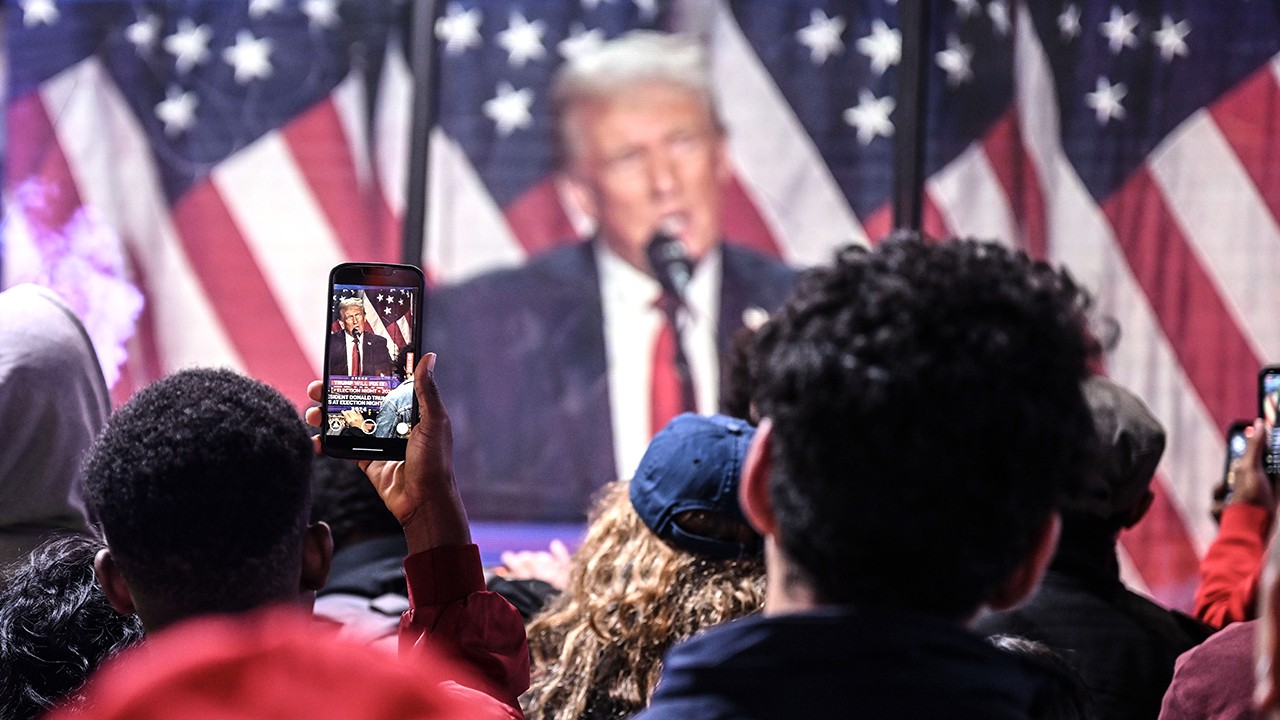
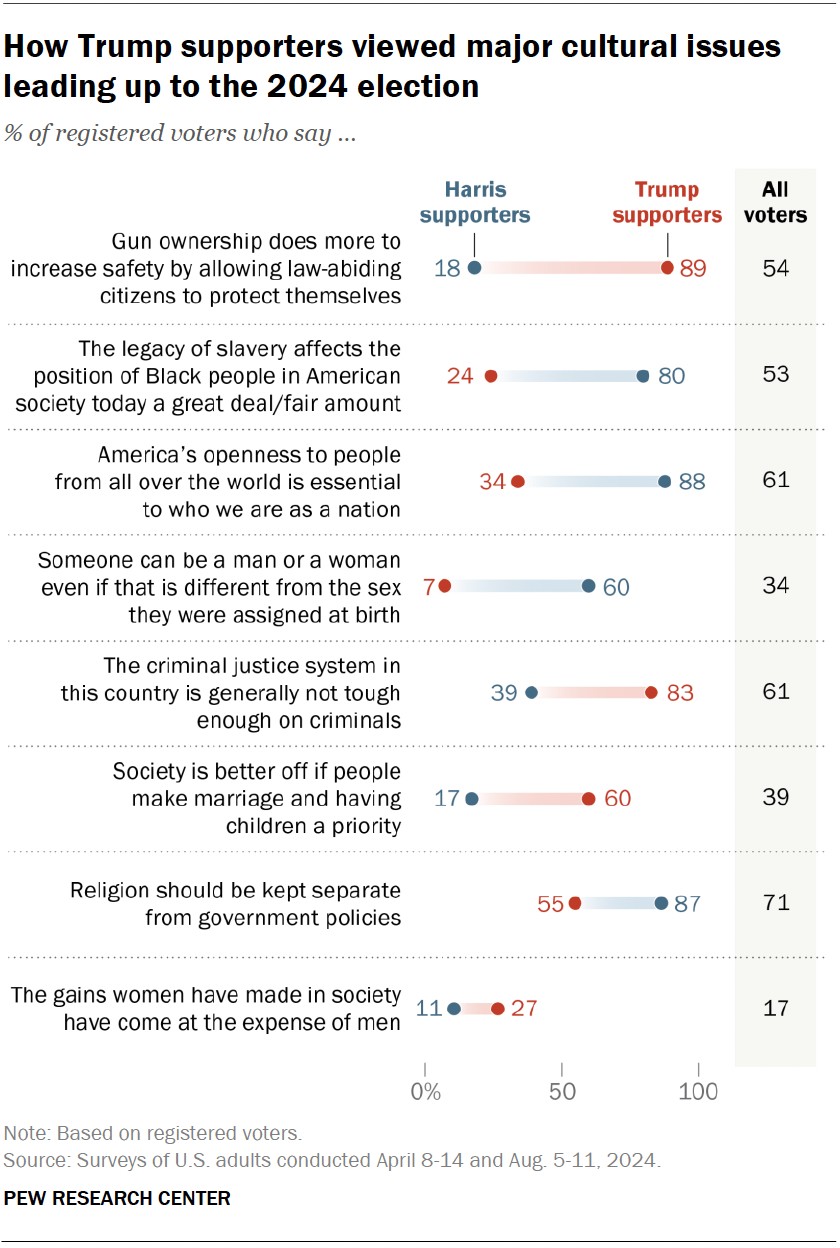
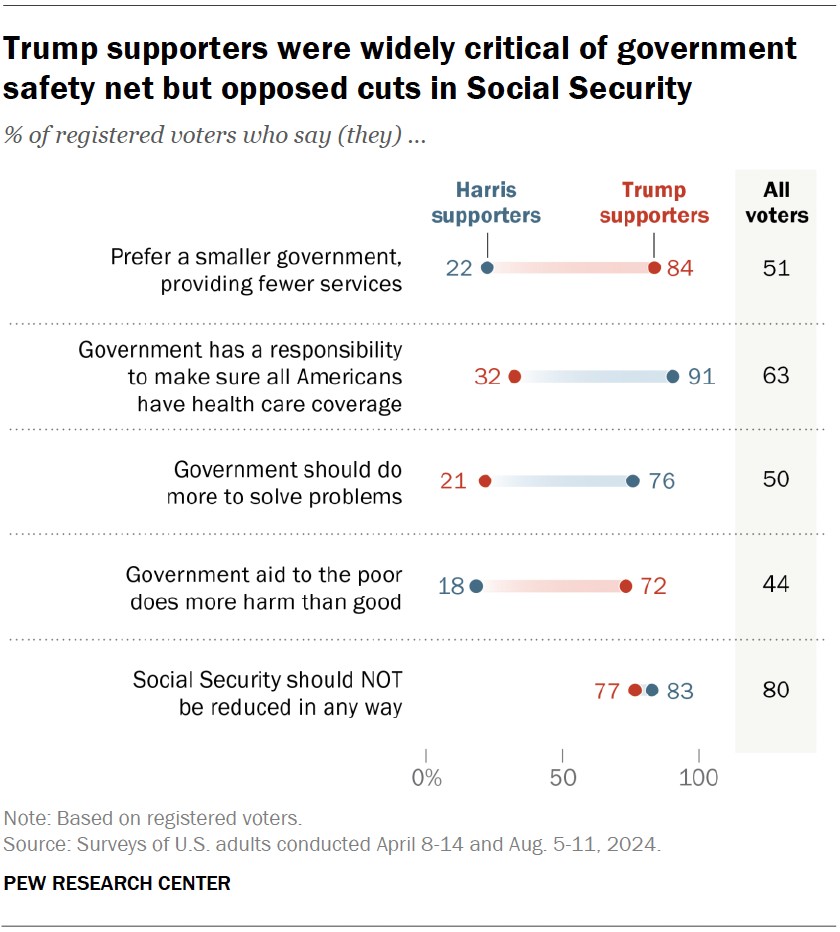
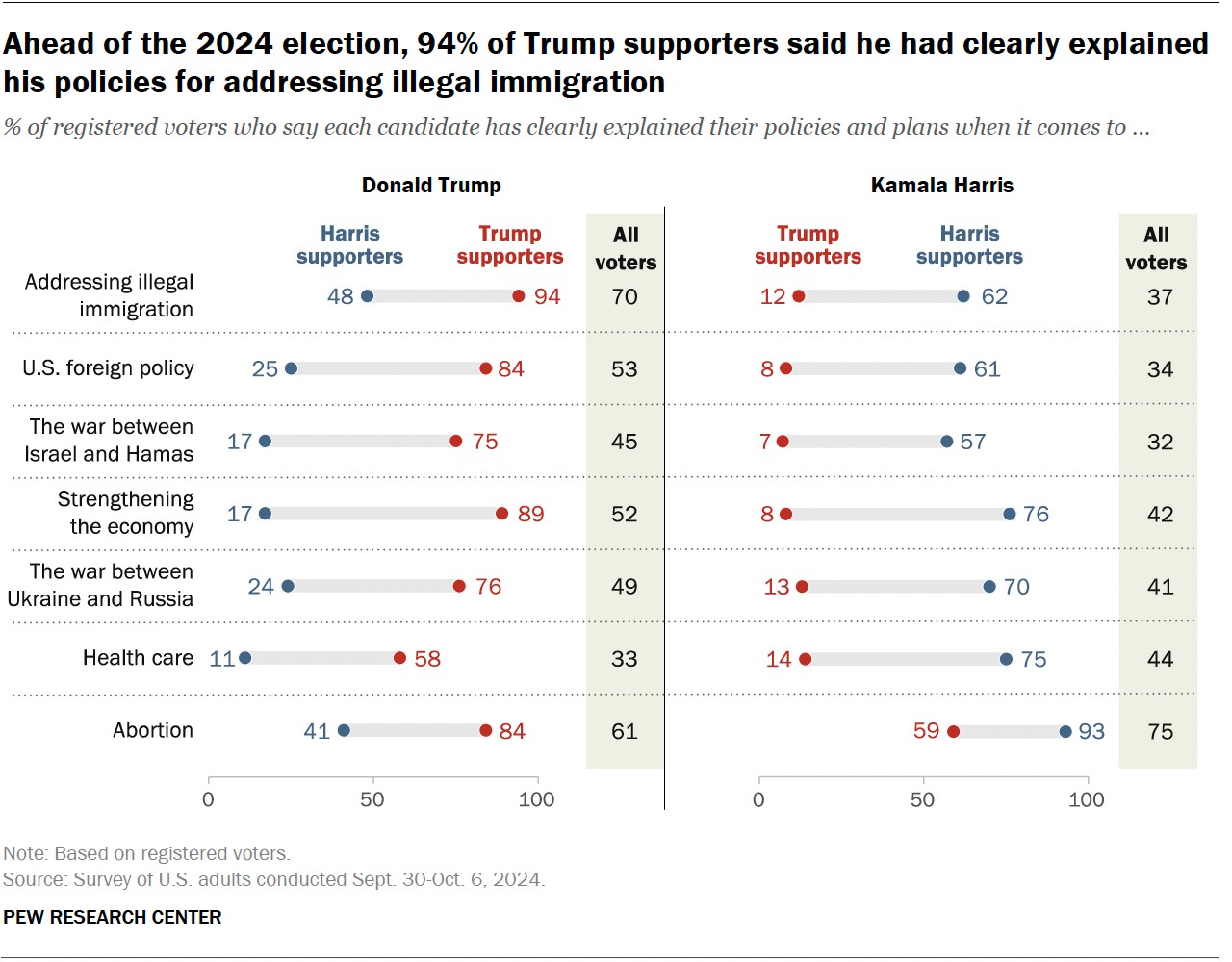
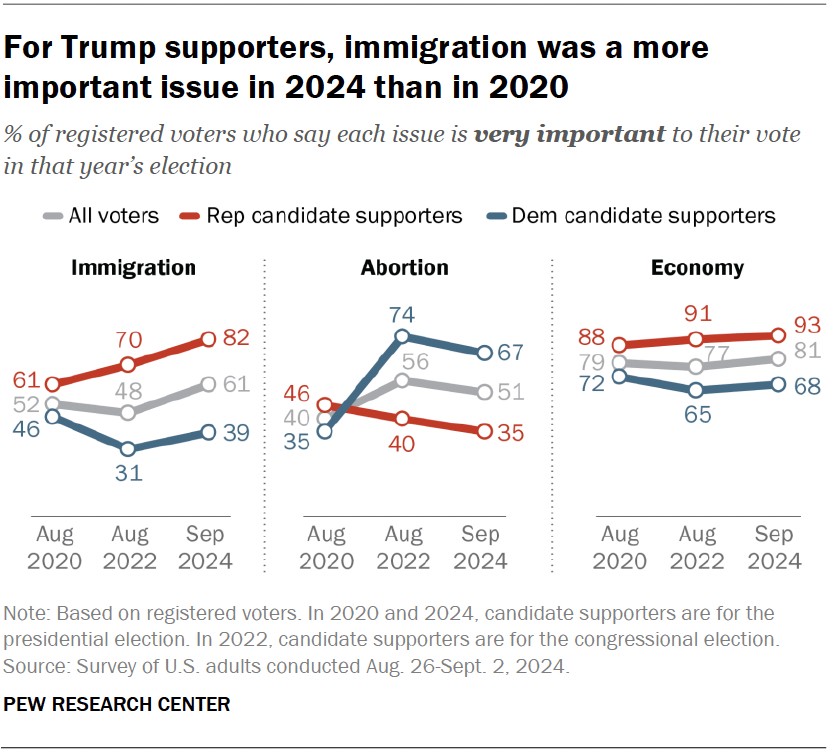
These issues reflect the priorities and concerns of Trump’s voter base, highlighting the importance of economic stability and border security in their decision-making process.
4. How Did Trump Supporters View Key Cultural Issues?
Trump supporters generally held unified views on several cultural issues, as revealed in polling conducted throughout 2024. These views often contrasted sharply with those of supporters of other political figures, such as Kamala Harris.
4.1. Key Cultural Issues and Trump Supporters’ Views:
- Biological Sex: 92% believed that biological sex is not mutable.
- Gun Ownership: 89% said gun ownership does more to increase than decrease safety.
- Criminal Justice: 83% viewed the criminal justice system as not tough enough on criminals.
- Legacy of Slavery: 75% did not think the legacy of slavery affects the position of Black people in American society today much or at all.
These unified views on cultural issues underscore the importance of shared values and beliefs in shaping the political preferences of Trump supporters.
5. What Were Trump Supporters’ Views On Government And Social Security?
Trump supporters generally favored a smaller government but opposed changes to Social Security. This reflects a common tension in conservative ideology, where there is a desire to limit government intervention in the economy while preserving popular social programs.
5.1. Key Views on Government and Social Security:
- Size of Government: 72% of Trump supporters said aid to the poor does more harm than good, indicating a preference for limited government intervention in social welfare.
- Social Security: Large majorities of both Trump (77%) and other candidate’s supporters (83%) opposed any reductions in the Social Security program, demonstrating broad support for this social safety net.
These views highlight the complex and sometimes contradictory attitudes of Trump supporters towards the role of government in society.
6. How Did Trump Supporters Perceive National Conditions?
Trump supporters held particularly negative views of national conditions, especially regarding the economy and the direction of the country. This pessimism was a significant factor in their support for Trump, who promised to bring about positive change and restore national greatness.
6.1. Key Perceptions of National Conditions:
- Satisfaction with the Country: A month before the election, only 5% of Trump supporters said they were satisfied with the way things were going in the country.
- Concern about Prices: In September, roughly nine-in-ten (89%) said they were very concerned about the price of food and consumer goods.
This widespread dissatisfaction with the state of the country fueled the desire for change and contributed to Trump’s appeal as a leader who could address these concerns.
7. Did Trump Supporters Understand His Policy Positions?
Ahead of the election, a significant majority of Trump supporters felt they understood his policy positions, particularly on issues such as immigration, the economy, and foreign policy. This clarity and perceived understanding of his policies were crucial in garnering their support.
7.1. Understanding of Trump’s Policy Positions:
- Illegal Immigration: In October, 94% of Trump supporters said he had clearly explained his policies for addressing illegal immigration.
- Economy and Foreign Policy: Large majorities also felt they understood his policies on the economy and foreign policy.
- Health Care: While still a majority, a slightly lower percentage (58%) said they knew what he would do regarding health care if he won the race.
This perception of clarity and understanding of Trump’s policy positions played a significant role in solidifying his support among voters.
8. What Actions Would Trump Supporters Find Acceptable or Unacceptable?
Trump supporters held nuanced views on what actions would be acceptable or unacceptable for him to take in office. While they were generally supportive of strong executive action, they also expressed concerns about potential abuses of power.
8.1. Acceptable Actions:
- Executive Orders: 58% said it would be definitely or probably acceptable for him to use executive orders to make policies if he couldn’t get his priorities through Congress.
- Investigating Political Opponents: 54% said it would be acceptable for him to order federal law enforcement officials to investigate his political opponents.
8.2. Unacceptable Actions:
- Firing Government Workers: 58% said it would be unacceptable for him to fire government workers for not being loyal to him.
- Pardoning Friends: 57% said it would be unacceptable for him to pardon friends or supporters who have been convicted of a crime.
These views reflect a balance between a desire for decisive leadership and a concern for upholding the rule of law and preventing corruption.
9. Did Trump Supporters Want Him To Focus On All Americans?
Despite their strong support for Trump, a majority of his backers believed that he should focus on addressing the concerns of all Americans, not just his supporters, if elected. This suggests a desire for unity and inclusivity, even among those who strongly identify with a particular political figure.
9.1. Focus on All Americans:
- Addressing Concerns: In October, 86% of Trump supporters said he should focus on addressing the concerns of all Americans, even if that meant disappointing some of those who had backed him.
This desire for inclusivity reflects a broader sentiment among voters that leaders should strive to represent and serve the interests of the entire population, regardless of political affiliation.
10. What Is The Significance Of Understanding Trump Voter Motivations?
Understanding the motivations behind why anyone would vote for Trump is crucial for fostering informed political discourse and bridging divides within society. By examining the values, concerns, and expectations of Trump voters, we can gain insights into the factors that shape their political choices and develop a more nuanced understanding of their perspectives. This understanding is essential for promoting constructive dialogue and finding common ground on issues facing the nation.
10.1. Benefits of Understanding Trump Voter Motivations:
- Informed Political Discourse: Understanding the reasons behind Trump’s support can lead to more informed and productive discussions about political issues.
- Bridging Divides: By recognizing the concerns and values of Trump voters, we can begin to bridge the divides that separate different groups within society.
- Effective Policy Making: Understanding the priorities of Trump voters can help policymakers develop more effective and responsive policies.
- Strengthening Democracy: By fostering a more inclusive and understanding political environment, we can strengthen the foundations of democracy.
By engaging with the motivations of Trump voters, we can move beyond stereotypes and generalizations and work towards a more unified and informed society.
11. How Does Economic Anxiety Influence Support For Trump?
Economic anxiety plays a significant role in influencing support for Donald Trump. Many voters who feel left behind by the changing economy are drawn to Trump’s promises of bringing back jobs, renegotiating trade deals, and revitalizing industries.
11.1. Key Economic Factors Influencing Support:
- Job Loss: Voters who have experienced job loss or fear losing their jobs may see Trump as a leader who can protect their livelihoods.
- Wage Stagnation: Those who have seen their wages stagnate or decline may be attracted to Trump’s promises of raising wages and improving economic opportunities.
- Trade Policies: Voters who believe that trade deals have hurt American workers may support Trump’s protectionist policies.
- Economic Inequality: Concerns about rising economic inequality may drive voters to support Trump’s populist message.
By addressing these economic anxieties, Trump taps into a deep well of discontent and offers voters a vision of economic revival and prosperity.
12. What Role Does Immigration Play In Trump’s Appeal?
Immigration is a central issue in Donald Trump’s appeal to voters. His hard-line stance on border security, including the construction of a wall on the U.S.-Mexico border, resonates with those who prioritize stricter immigration control.
12.1. Key Immigration Policies Influencing Support:
- Border Security: Trump’s emphasis on border security and the construction of a wall appeals to voters who believe that stricter border control is necessary to protect the country.
- Illegal Immigration: His tough stance on illegal immigration and promises to deport undocumented immigrants resonate with those who believe that illegal immigration is a threat to national security and the economy.
- Immigration Reform: Voters who support comprehensive immigration reform may be drawn to Trump’s promises of reforming the immigration system to prioritize American interests.
By focusing on these immigration issues, Trump taps into concerns about national security, economic competition, and cultural identity, and offers voters a vision of a more secure and prosperous nation.
13. How Do Cultural Values Shape Support For Trump?
Cultural values play a significant role in shaping support for Donald Trump. His conservative stance on social issues such as abortion, gun rights, and religious freedom attracts voters who share these values.
13.1. Key Cultural Values Influencing Support:
- Abortion: Voters who oppose abortion may support Trump’s efforts to appoint conservative judges and restrict abortion access.
- Gun Rights: Those who believe in the right to bear arms may support Trump’s defense of the Second Amendment.
- Religious Freedom: Voters who prioritize religious freedom may be drawn to Trump’s promises to protect religious institutions and individuals.
- Traditional Values: Those who believe in traditional family values and cultural norms may support Trump’s efforts to preserve these values.
By aligning himself with these cultural values, Trump appeals to voters who feel that their way of life is under threat and offers them a vision of a society that reflects their beliefs and values.
14. What Impact Does Nationalism Have On Support For Trump?
Nationalism is a powerful force in shaping support for Donald Trump. His “America First” approach emphasizes national sovereignty and prioritizes American interests in international relations, appealing to patriotic voters.
14.1. Key Nationalist Policies Influencing Support:
- Economic Nationalism: Trump’s emphasis on protecting American industries and workers through tariffs and trade deals resonates with voters who believe that the U.S. should prioritize its own economic interests.
- Military Strength: His focus on rebuilding the military and asserting American power on the world stage appeals to voters who believe that the U.S. should be a dominant force in international affairs.
- National Identity: Voters who feel a strong sense of national pride and identity may be drawn to Trump’s rhetoric about restoring American greatness and defending American values.
By appealing to these nationalist sentiments, Trump taps into a deep well of patriotism and offers voters a vision of a strong and prosperous America.
15. How Does Populism Contribute To Trump’s Popularity?
Populism is a key element in Donald Trump’s popularity. His communication style and his focus on the concerns of ordinary people resonate with voters who feel ignored by the political establishment.
15.1. Key Populist Strategies Influencing Support:
- Anti-Elitism: Trump’s criticism of the political elite and the “deep state” resonates with voters who feel disenfranchised and ignored by the system.
- Direct Communication: His direct and often controversial communication style is seen as authentic and refreshing by supporters who are tired of political correctness.
- Focus on Ordinary People: Trump’s emphasis on the concerns of ordinary people, such as job creation, wage increases, and border security, appeals to voters who feel that their voices are not being heard.
- Challenging the Status Quo: His willingness to challenge the established norms and practices of Washington signals a departure from traditional politics and appeals to voters who are seeking change.
By employing these populist strategies, Trump connects with voters on an emotional level and offers them a vision of a government that is responsive to their needs and concerns.
16. How Does Social Media Influence The Perception Of Trump?
Social media significantly influences the perception of Donald Trump, both positively and negatively. His active use of platforms like Twitter has allowed him to communicate directly with his supporters, bypassing traditional media outlets.
16.1. Positive Influences of Social Media:
- Direct Communication: Trump’s use of social media allows him to communicate directly with his supporters, bypassing traditional media outlets and controlling his own narrative.
- Mobilization: Social media platforms enable Trump to mobilize his supporters and rally them around his message.
- Amplification: Social media amplifies Trump’s message, allowing it to reach a wider audience and generate buzz.
16.2. Negative Influences of Social Media:
- Misinformation: Social media platforms can be used to spread misinformation and conspiracy theories, which can damage Trump’s credibility.
- Polarization: Social media can contribute to political polarization by creating echo chambers and reinforcing existing biases.
- Criticism: Trump’s use of social media is often criticized for being divisive, inflammatory, and unprofessional.
Despite these challenges, social media remains a powerful tool for shaping public opinion and influencing the perception of Donald Trump.
17. How Can We Better Understand The Motivations Of Trump Voters?
To better understand the motivations of Trump voters, it is essential to engage with them in a respectful and open-minded manner, seeking to understand their concerns and perspectives.
17.1. Strategies for Understanding Trump Voters:
- Listen Actively: Take the time to listen to Trump voters and understand their concerns and perspectives, without interrupting or judging them.
- Ask Open-Ended Questions: Ask open-ended questions that encourage Trump voters to share their thoughts and feelings, rather than leading questions that suggest a particular answer.
- Seek Common Ground: Look for areas of common ground and shared values, even if you disagree on political issues.
- Avoid Stereotypes: Avoid making generalizations or stereotypes about Trump voters, recognizing that they are a diverse group with a wide range of views and experiences.
- Be Respectful: Treat Trump voters with respect, even if you disagree with their political views.
By employing these strategies, we can foster a more understanding and inclusive political environment.
18. What Are The Potential Consequences Of Ignoring Trump Voter Motivations?
Ignoring the motivations of Trump voters can have several negative consequences, including increased political polarization, social division, and ineffective policy making.
18.1. Negative Consequences of Ignoring Trump Voters:
- Political Polarization: Ignoring the concerns and perspectives of Trump voters can lead to increased political polarization and division.
- Social Division: Ignoring the motivations of Trump voters can exacerbate social divisions and undermine social cohesion.
- Ineffective Policy Making: Ignoring the priorities of Trump voters can result in policies that are ineffective or counterproductive.
- Erosion of Democracy: Ignoring the voices of a significant portion of the population can erode trust in democratic institutions and undermine the legitimacy of government.
By addressing the concerns and perspectives of Trump voters, we can create a more inclusive and effective political system.
19. How Do Generational Differences Impact Support For Trump?
Generational differences play a significant role in shaping support for Donald Trump. Different generations have different values, experiences, and priorities, which can influence their political choices.
19.1. Generational Differences in Support for Trump:
- Baby Boomers: Baby Boomers, who came of age during the 1960s and 1970s, may be drawn to Trump’s promises of restoring traditional values and economic prosperity.
- Generation X: Generation X, who came of age during the 1980s and 1990s, may be attracted to Trump’s anti-establishment message and his focus on individual freedom and responsibility.
- Millennials: Millennials, who came of age in the 21st century, may be more likely to support progressive policies and may be critical of Trump’s conservative views on social and environmental issues.
- Generation Z: Generation Z, who are just beginning to enter the political arena, may be more concerned about issues such as climate change, social justice, and economic inequality, and may be less likely to support Trump’s policies.
Understanding these generational differences is essential for developing effective strategies for engaging with voters and addressing their concerns.
20. How Does Education Level Correlate With Support For Trump?
Education level is often correlated with support for Donald Trump. Generally, voters with lower levels of formal education are more likely to support Trump, while those with higher levels of education are less likely to do so.
20.1. Education Level and Support for Trump:
- High School Graduates: Voters with a high school diploma or less may be more likely to support Trump’s promises of bringing back jobs and protecting American industries.
- College Graduates: Voters with a college degree may be more likely to support progressive policies and may be critical of Trump’s conservative views on social and environmental issues.
- Postgraduate Degrees: Voters with postgraduate degrees may be even more likely to support progressive policies and may be highly critical of Trump’s policies and rhetoric.
This correlation between education level and support for Trump highlights the importance of education in shaping political attitudes and beliefs.
21. What Are The Long-Term Implications Of Trump’s Influence On The Republican Party?
Donald Trump’s influence on the Republican Party has had significant and potentially long-lasting implications. His rise to power has transformed the party’s ideology, rhetoric, and base of support.
21.1. Long-Term Implications for the Republican Party:
- Shift to Populism: Trump’s success has led to a shift towards populism within the Republican Party, with a greater emphasis on appealing to ordinary people and challenging the political establishment.
- Increased Nationalism: Trump’s “America First” approach has reinforced nationalist sentiments within the Republican Party, with a greater focus on protecting American interests and asserting American power on the world stage.
- Erosion of Traditional Conservatism: Trump’s policies and rhetoric have challenged traditional conservative principles such as free trade, limited government, and fiscal responsibility.
- Changing Demographics: Trump’s appeal to working-class voters and those without a college degree has changed the demographics of the Republican Party’s base of support.
These changes could have significant implications for the future of the Republican Party and American politics.
22. How Can The U.S. Move Forward After Divisive Elections?
Moving forward after divisive elections requires a commitment to healing divisions, fostering understanding, and working together to address the challenges facing the nation.
22.1. Strategies for Moving Forward:
- Healing Divisions: Take steps to heal the divisions that have been created by the election, such as reaching out to those with different political views and seeking common ground.
- Fostering Understanding: Work to foster understanding and empathy between different groups, by listening to their concerns and perspectives and seeking to bridge the divides that separate them.
- Addressing Challenges: Focus on addressing the challenges facing the nation, such as economic inequality, climate change, and social injustice, by working together to find solutions that benefit all Americans.
- Promoting Civic Engagement: Encourage civic engagement and participation in the political process, by voting, volunteering, and advocating for policies that you believe in.
By working together in a spirit of unity and cooperation, the U.S. can overcome the challenges of divisive elections and build a stronger and more prosperous nation for all.
23. FAQ: Understanding Why Anyone Would Vote For Trump
-
What are the main reasons people support Donald Trump?
- People support Donald Trump for various reasons, including his economic policies, stance on immigration, cultural values, nationalist approach, and populist appeal.
-
How does Trump’s economic platform attract voters?
- Trump’s economic policies, such as tax cuts, deregulation, and trade renegotiation, appeal to voters who believe these measures will stimulate economic growth and create jobs.
-
Why is immigration a key issue for Trump supporters?
- Trump’s hard-line stance on border security and illegal immigration resonates with those who prioritize stricter immigration control and national security.
-
What cultural values do Trump supporters often share?
- Trump supporters often share conservative cultural values related to abortion, gun rights, religious freedom, and traditional family values.
-
How does nationalism play a role in Trump’s support?
- Trump’s “America First” approach emphasizes national sovereignty and prioritizes American interests, appealing to patriotic voters.
-
What is the appeal of Trump’s populist message?
- Trump’s communication style and focus on the concerns of ordinary people resonate with voters who feel ignored by the political establishment.
-
How has social media influenced perceptions of Trump?
- Social media has allowed Trump to communicate directly with supporters, mobilize them, and amplify his message, though it also faces challenges like misinformation and polarization.
-
How do generational differences affect support for Trump?
- Generational differences in values, experiences, and priorities influence political choices, with varying levels of support for Trump among different generations.
-
Is there a correlation between education level and support for Trump?
- Generally, voters with lower levels of formal education are more likely to support Trump, while those with higher levels of education are less likely to do so.
-
What are the potential long-term effects of Trump’s influence on the Republican Party?
- Trump’s influence could lead to a lasting shift towards populism, increased nationalism, erosion of traditional conservatism, and changing demographics within the Republican Party.
Understanding these frequently asked questions provides additional insight into the complex factors driving support for Donald Trump.
24. Seeking Clarity? WHY.EDU.VN Offers Expert Insights
Navigating the complexities of political motivations can be challenging. At WHY.EDU.VN, we provide detailed analysis and expert perspectives to help you understand the multifaceted reasons behind voter choices. If you’re seeking clear, reliable answers, our platform connects you with specialists who can address your specific questions.
Do you have more questions about political science, economics, or social trends? Visit WHY.EDU.VN to ask your questions and receive answers from experts in the field. We are located at 101 Curiosity Lane, Answer Town, CA 90210, United States. You can also reach us via Whatsapp at +1 (213) 555-0101. Let why.edu.vn be your guide to understanding the world around you.